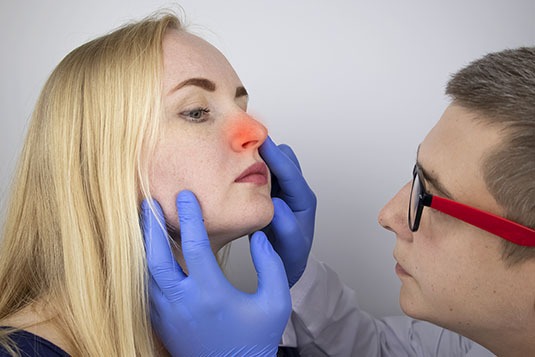Removing nasal polyps, other treatments and how we can help
Many patients contact our clinic to discuss nasal polyps treatment. While removal of nasal polyps is an option there are also other nasal polyp treatments available. Here we cover what are nasal polyps, symptoms and diagnosis of nasal polyps as well as what to expect from your treatment of nasal polyposis.
What are nasal polyps
Nasal polyps are soft, non-cancerous growths that can develop in the lining of your nose. They are commonly located in the nasal passages or paranasal sinuses. Patients with small polyps may not even be aware they are there, whereas large polyps tend to cause nasal obstruction and associated symptoms.
What causes nasal polyps
Nasal polyps grow in inflamed tissue of the nasal lining, also referred to as the nasal mucosa. Nasal mucosa produces a thin mucus blanket tissue that helps to protect your nose and adds moisture to the air before it travels down to your lungs.
During the course of an allergy or infection, nasal lining tends to become inflamed, resulting in irritation, swelling and excessive mucus production. When irritation is prolonged, the lining may form a nasal polyp.
Some of the triggers for nasal polyps include:
- Allergic rhinitis or hayfever
- Asthma
- Chronic sinusitis
- Structural abnormalities
- Genetics – which causes the nasal lining to react more strongly to inflammation
What are the symptoms of nasal polyps
Nasal polyps symptoms include:
- Nasal congestion
- Running nose with mucus or pus
- Breathing problems
- Postnasal drip (excess mucus drips down your throat)
- Snoring
- Sleep apnea
- Reduced sense of smell or taste
- Sinus pressure and headaches
Nasal polyp diagnosis
Nasal polyps are usually visible when looking into the nasal passages with an instrument called a nasoendoscope. Polyps can be deeper in the sinuses though, in the area behind the bones of your face that connect with your nasal cavity. Your specialist may need to inspect your sinuses by performing a nasal endoscopy. Allergy tests, CT scans or even MRI’s may also be recommended to complete a thorough evaluation.
Nasal endoscopy
A nasal endoscopy (nasoendoscopy) is a procedure that can help to diagnose nasal polyps. It’s carried out by your ENT specialist (also known as an Otolaryngologist) with an instrument called an nasoendoscope. An endoscope is a thin, flexible tube with a light and a tiny camera that allows your specialist to look more deeply within the nasal and sinus passages, aiding in the diagnosis of nasal polyps.
Nasal polyp treatments
In the first instance, your nose and sinuses should be assessed by an experienced ENT specialist. Once nasal polyps have been diagnosed, treatment options can be discussed. It is important to identify the underlying cause of the nasal polyps so the treatment can be more targeted and successful.
Non-surgical / conservative treatment options may include:
- Antihistamines – particularly useful for inflammation caused by allergies
- Nasal steroid sprays – for temporary reduction of symptoms, can help clear blockages and shrink polyps
- Oral steroids – for temporary reduction of symptoms, although only a short-term treatment due to potential side effects
- Antibiotics – useful for treating polyps caused by bacterial infection
Nasal polyps removal and surgery
In situations where non-surgical treatments don’t provide effective relief from symptoms, removal of nasal polyps may be considered.
Nasal polyps removal is usually done as part of Functional Endoscopic Sinus Surgery or FESS operation. This is a minimally invasive procedure done through the nostrils so there are no visible scars. During the operation, a small camera is used to guide the instruments to remove nasal polyps, widen nasal passage as well as open the nasal sinuses. The aim of the surgery is to remove all the infection and inflammation within the nasal sinus as well as opening of the nasal sinuses to allow delivery of the medication after surgery. The surgery can be done as a day procedure and only requires minimum time off work.
Removal of nasal polyps and nasal and sinus surgery may lead to a reduction in symptoms. However, additional medical treatment such as intranasal steroids may be required to prevent nasal polyps growing back. Ultimately, successful treatment of nasal polyps involve the correct diagnosis of the underlying factors contributing towards it as well as the comprehensive management of the nasal lining with both surgical and medical treatment.
Our team
Our team is highly regarded in the field of nasal polyp surgery:
Mr Yi Chen Zhao (nose specialist)
- The nose specialist and current head of nasal and sinus surgery at the Royal Victorian Eye and Ear Hospital.
- Specialist at the Royal Melbourne Hospital and St Vincent’s Hospital with the neurosurgeons that perform operations from the nose to the brain
- Nasal allergy and immunotherapy specialist
Mr. Tim Baker
- Experienced head, neck and rhinoplasty surgeon
- 20 years’ experience in all aspects of ENT specialising in rhinoplasty and head and neck cancers
Mr. Nathan Hayward
- ENT surgeon in Melbourne
- Unique expertise in sleep and snoring surgery
- Works with respiratory physicians to specialise in sleep studies and sleep apnoea
Mr. Sam Flatman
- ENT surgeon in Melbourne and visit Gippsland.
- Works at Peter MacCallum Cancer Centre treating head and neck cancers.
What to expect from nasal polyp treatment
Before progressing with nasal polyp treatment at ENT Specialist Group, we want you to have all the information you need to make informed decisions and know exactly what to expect.
There is no single treatment for nasal polyps as every case is different. Some patients may experience relief from non-surgical options while others may require nasal polyp removal or other surgery to help them control the symptoms.
Fast appointments for nasal polyps
While you might feel ready to start treatment for nasal polyps, long waiting lists often mean life can get in the way. At ENT Specialist Group, we’re HotDoc integrated which means patients can book and schedule an appointment online or via mobile any time of night or day. We aim to accommodate urgent GP referrals within 24 hours.
What happens next?
If you’re in Melbourne or regional areas of Victoria and you’re concerned about nasal polyps, we invite you to contact us for a consultation. We will discuss all your options and help you feel empowered to take the next step.
Where can I make an appointment for nasal polyp treatment?
To help ensure our nasal polyp treatments are accessible for all Victorians, Ww consult at various locations across metropolitan Melbourne and regional Victoria.
You can visit us at:
- Heidelberg
- Bendigo
- Shepparton
- Sale
If you’d like to understand more about treatment and surgical options, contact us today or make an online booking.


